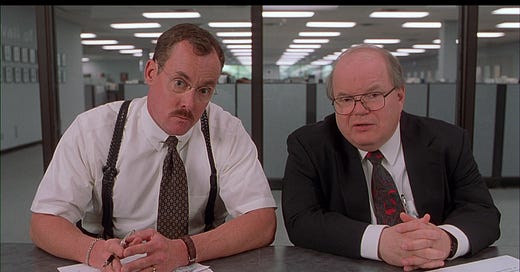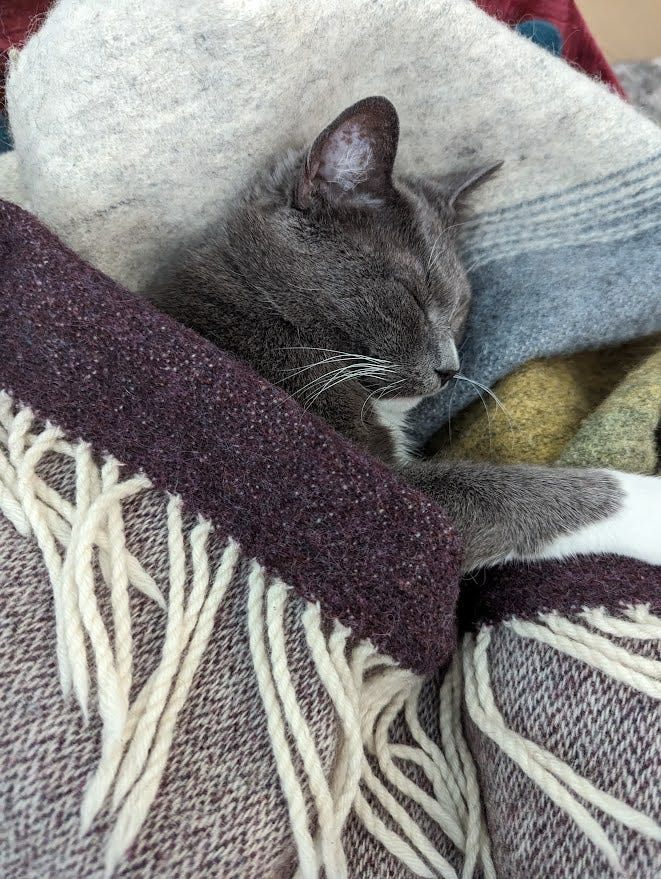“What would you say, you do here?” ~ Office Space
Welcome back to The Cubicle at the End of the Galaxy. This week, we’re exploring the most often asked question by readers, friends, family members, authors, and (sometimes) even colleagues.
What do book editors *actually* do?
A simple question, with - as you can probably guess - a not-so-simple answer. One of my favorite things to do, when someone asks, is to just ask in return what they *think* a book editor does. So I did just that with newsletter readers. Some of their replies:
“I’m sure a lot of it has to do with reading, finding things that don’t work, making suggestions for edits…”
“…next to spellchecking, wording and sentence structure, editing often includes the story itself as well, meaning keeping the continuity in mind and giving feedback on how well the story works generally.”
“ Since there’s the word edit in editor, I’ve always thought that an editor is a person who’ll accompany the author in a way by reading their work and sending them feedback about what to change in the book and what to edit. I was wondering if it’s the role of an editor to choose if a story is worth being signed to a publishing house or not.”
Not surprising that many answers focus on reading and working with text, which is absolutely part of being an editor. It’s not the only part, but - hold that thought.
Are we even asking the right question?
Maybe a better question is - what are editors trying to accomplish? What’s the “north star” that guides feedback? Because after all, the final text is not the editor’s story, it’s the author’s. So, simply put - the goal of an editor is to make a piece of text “the best version of itself.” And every piece of feedback should be in service of that goal.
The goal of an editor is to make a piece of text “the best version of itself.”
How editors accomplish that involves multiple stages of editing moving from the most macro story concepts to the most micro.
(This is where I remind you, dear reader, that all of this is merely the perspective of one editor working in the publishing industry. Ask 5 other editors and you’ll probably get five distinct answers about editing. Which you should do. Book editors are cool people, and they love talking about books.)
Editing starts with big-picture feedback looking at elements like pace, theme, plot, point of view, and character arc. This focus is often called developmental editing. More granular edits and feedback are often identified to address the issues that the developmental edit identifies.
The next kind of editing, where the focus is on improving individual scenes, action beats, dialogue exchanges, etc is known as line editing. These edits ensure that the “blocking” of an action scene is clear so you know what’s happening, that a particular character’s dialogue is consistent and sounds correct to that character, etc.
The most granular kind of editing looks at consistency and clarity of language, and issues of grammar and style. This focused type of editing is known as copyediting. This is less about the shape of a story and more about ensuring that the language is as clear and precise as possible.
[You may wonder where proofreading fits in. Proofreading and copyediting sometimes get lumped together or even used interchangeably. Proofreading - in publishing terms - is the evaluation of the page proofs for errors like typos, formatting mistakes (random extra lines or spaces between words), and visual appeal (like widows and orphans). This occurs once a book moves into designed typeset pages - usually as a PDF.]
I know that I’m discussing these stages as separate discrete levels, but editing is a holistic endeavor, with these focuses overlapping and happening concurrently. But the reason to lay them out distinctly is because while there are different types of editing, there are also different types of editors. So any discussion of what an editor *does* must invariably specify which kind of editor they are.
(Btw, I sincerely appreciate everyone who sends in questions or otherwise engages via the newsletter chat! You’re always welcome to join in.)
Developmental, line, or copyeditor can all be distinct careers. An editor’s role can also overlap several or all of those specialties. The size/structure of whatever organization they work for usually has a strong influence on how many of those roles exist discreetly vs overlapping.
The Answer to the Question - Sort Of
Which ones am I? Well, it’s sort of a double-trick question. Because I’m all of them, at one point or another. Though I do less copyediting - in part because I’m lucky to work with some gifted ones! It’s also a trick question because I’m also another type of editor that can also have its own role or overlap with those other specialties. The acquisitions editor.
An acquisitions editor is responsible for bringing books into the publishing house. Assessing manuscripts, negotiating contract terms, making purchases, and shaping the overall publishing list of books their imprint will bring to readers. After all, someone needs to figure out what book to edit in the first place.
This speaks to a larger notion about being a book editor, which is that editing the text is just part of the career. For me, and many others, in addition to the editing, our job falls somewhere between being a talent manager, talent scout, negotiator, sales consultant, and project manager.
And to be quite honest, all of those other roles make up more of the total work that I do than any of the reading and various editing. Sometimes, as much as 70% of my work might not have anything to do with reading/evaluating, or improving text. Instead, it’s contributing to or helping others facilitate all the other processes and milestones that are required to take a story from idea to finished book. That’s what makes up the day-to-day and even moment-to-moment of being an editor.
So - when someone asks me “what does a book editor do?” the answer I usually tell them is this: I read a lot, but not nearly as much as you think. I work with authors to make their books the best possible version of itself, and otherwise, I help make sure the publishing trains run on time.
Which is the truth, though a little truncated, or rather, a little edited.
In the Next Dispatch from the Cubicle…
We roll on into 2024, and a full pile of manuscripts that someone [me, I guess] needs to get around to editing. But, aside from all that, there’s more coming about the weird world of publishing, and some newsletters on the following:
How to manage having a “dream job” and what happens, when the fun disappears
Who decides how and why books are the size that they are?
An introduction to an upcoming series of authors talking about editing.
We’ve talked about what an editor does, but *how* do they do it?
And if you ever have questions, want to suggest topics, or want to help shape dispatches from the Cubicle in general, feel free to drop a question in the chat.
-Be Well.






"Or rather, a little edited" lol. Your job certainly has a wide scope. I'm looking forward to all the future posts you mentioned!